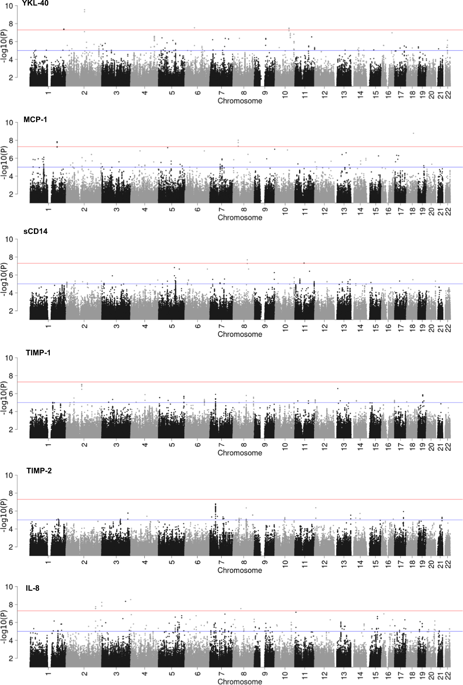当前位置:
X-MOL 学术
›
Transl. Psychiaty
›
论文详情
Our official English website, www.x-mol.net, welcomes your
feedback! (Note: you will need to create a separate account there.)
Genome-wide study of immune biomarkers in cerebrospinal fluid and serum from patients with bipolar disorder and controls.
Translational Psychiatry ( IF 5.8 ) Pub Date : 2020-02-05 , DOI: 10.1038/s41398-020-0737-6 Ruyue Zhang 1 , Jie Song 1 , Anniella Isgren 2 , Joel Jakobsson 2 , Kaj Blennow 2, 3 , Carl M Sellgren 4, 5 , Henrik Zetterberg 2, 3, 6, 7 , Sarah E Bergen 1 , Mikael Landén 1, 2
Translational Psychiatry ( IF 5.8 ) Pub Date : 2020-02-05 , DOI: 10.1038/s41398-020-0737-6 Ruyue Zhang 1 , Jie Song 1 , Anniella Isgren 2 , Joel Jakobsson 2 , Kaj Blennow 2, 3 , Carl M Sellgren 4, 5 , Henrik Zetterberg 2, 3, 6, 7 , Sarah E Bergen 1 , Mikael Landén 1, 2
Affiliation

|
Bipolar disorder is a common, chronic psychiatric disorder. Despite high heritability, there is a paucity of identified genetic risk factors. Immune biomarkers are under more direct genetic influence than bipolar disorder. To explore the genetic associations with immune biomarker levels in cerebrospinal fluid (CSF) and blood serum which previously showed differences in bipolar disorder, we performed a study involving 291 individuals (184 bipolar disorder patients and 107 controls). The biomarkers assayed in both CSF and serum were: chitinase-3-like protein-1 (YKL-40), monocyte chemoattractant protein-1 (MCP-1), soluble cluster of differentiation (sCD14), tissue inhibitor of metalloproteinases-1 and 2 (TIMP-1 and TIMP-2). C-reactive protein (CRP) was only quantified in serum, and interleukin 8 (IL-8) measures were only available in CSF. Genome-wide association studies were conducted using PLINK for each of three genotyping waves and incorporated covariates for population substructure, age, sex, and body mass index (BMI). Results were combined by meta-analysis. Genome-wide significant associations were detected for all biomarkers except TIMP-1 and TIMP-2 in CSF. The strongest association in CSF was found for markers within the CNTNAP5 gene with YKL-40 (rs150248456, P = 2.84 × 10-10). The strongest association in serum was also for YKL-40 but localized to the FANCI gene (rs188263039, P = 5.80 × 10-26). This study revealed numerous biologically plausible genetic associations with immune biomarkers in CSF and blood serum. Importantly, the genetic variants regulating immune biomarker levels in CSF and blood serum differ. These results extend our knowledge of how biomarkers showing alterations in bipolar disorder are genetically regulated.
中文翻译:

双相情感障碍患者和对照者脑脊液和血清中免疫生物标志物的全基因组研究。
双相情感障碍是一种常见的慢性精神疾病。尽管遗传率很高,但缺乏已确定的遗传风险因素。与双相情感障碍相比,免疫生物标志物受到更直接的遗传影响。为了探索先前显示双相情感障碍差异的脑脊液 (CSF) 和血清中免疫生物标志物水平的遗传关联,我们进行了一项涉及 291 名个体(184 名双相情感障碍患者和 107 名对照)的研究。在脑脊液和血清中检测的生物标志物是:几丁质酶 3 样蛋白 1 (YKL-40)、单核细胞趋化蛋白 1 (MCP-1)、可溶性分化簇 (sCD14)、金属蛋白酶组织抑制剂 1 和2(TIMP-1 和 TIMP-2)。C 反应蛋白 (CRP) 仅在血清中进行量化,而白细胞介素 8 (IL-8) 测量仅在 CSF 中可用。使用 PLINK 对三个基因分型波中的每一个进行全基因组关联研究,并结合人口亚结构、年龄、性别和体重指数 (BMI) 的协变量。通过荟萃分析合并结果。脑脊液中除 TIMP-1 和 TIMP-2 外的所有生物标志物均检测到全基因组显着关联。CSF 中最强的关联发现 CNTNAP5 基因内的标记与 YKL-40 (rs150248456, P = 2.84 × 10-10)。血清中最强的关联也与 YKL-40 相关,但定位于 FANCI 基因(rs188263039,P = 5.80 × 10-26)。这项研究揭示了脑脊液和血清中免疫生物标志物的许多生物学上合理的遗传关联。重要的是,调节脑脊液和血清中免疫生物标志物水平的遗传变异不同。
更新日期:2020-02-06
中文翻译:

双相情感障碍患者和对照者脑脊液和血清中免疫生物标志物的全基因组研究。
双相情感障碍是一种常见的慢性精神疾病。尽管遗传率很高,但缺乏已确定的遗传风险因素。与双相情感障碍相比,免疫生物标志物受到更直接的遗传影响。为了探索先前显示双相情感障碍差异的脑脊液 (CSF) 和血清中免疫生物标志物水平的遗传关联,我们进行了一项涉及 291 名个体(184 名双相情感障碍患者和 107 名对照)的研究。在脑脊液和血清中检测的生物标志物是:几丁质酶 3 样蛋白 1 (YKL-40)、单核细胞趋化蛋白 1 (MCP-1)、可溶性分化簇 (sCD14)、金属蛋白酶组织抑制剂 1 和2(TIMP-1 和 TIMP-2)。C 反应蛋白 (CRP) 仅在血清中进行量化,而白细胞介素 8 (IL-8) 测量仅在 CSF 中可用。使用 PLINK 对三个基因分型波中的每一个进行全基因组关联研究,并结合人口亚结构、年龄、性别和体重指数 (BMI) 的协变量。通过荟萃分析合并结果。脑脊液中除 TIMP-1 和 TIMP-2 外的所有生物标志物均检测到全基因组显着关联。CSF 中最强的关联发现 CNTNAP5 基因内的标记与 YKL-40 (rs150248456, P = 2.84 × 10-10)。血清中最强的关联也与 YKL-40 相关,但定位于 FANCI 基因(rs188263039,P = 5.80 × 10-26)。这项研究揭示了脑脊液和血清中免疫生物标志物的许多生物学上合理的遗传关联。重要的是,调节脑脊液和血清中免疫生物标志物水平的遗传变异不同。











































 京公网安备 11010802027423号
京公网安备 11010802027423号